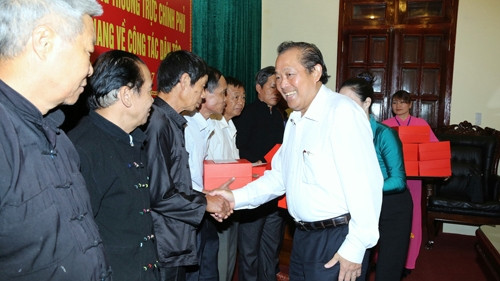The government official made the suggestion while holding a working session with local authorities, on April 26, on ethnic affairs in the locale.
Reports by the Ha Giang authorities at the meeting showed that the province has a population of more than 800,000 people, of which the Mong ethnic group accounts for 32%. There are six ethnic minorities with a population of less than 10,000 people.
Up to now, 3,910 households in Ha Giang have been supported with production land, over 58,000 poor households have been given preferential loans, and more than 300,000 poor and near-poor people have been trained in agricultural techniques.
In addition, more than 17,000 poor households have been supported to build new houses and repair their homes, 100% of poor students are exempted from school fees, and 100% of poor people have been granted health insurance cards.
Since 2011, over 78,000 local workers have been provided with vocational training and employment (of which 43,000 are ethnic minorities in rural areas). The proportion of trained workers increased from 30% in 2010 to 46% in 2015.
Speaking at the meeting, Deputy PM Binh highly appreciated implementation results of ethnic programmes and policies by Ha Giang Province and praised efforts and achievements by prestigious people and hamlet elders and chiefs in the province in recent years that has importantly contributed to local socio-economic development, national security and defence and preservation and promotion of ethnic cultural identities.
He stressed that in the past years, the Party and State have promulgated a range of policies on socio-economic development for ethnic minority communities, including the 135 Programme, support policies for residential land, production land and water for poor ethnic minorities, policy supporting poor ethnic minority students, and local staff training policy.
The deputy PM stated that the socio-economic situation in ethnic minority areas has significantly improved with their ethnic identity maintained and promoted, the great national unity bloc unceasingly raised and essential foundations in ethnic minority areas with special difficulties well invested. Up to now, 85% of households have been connected to the national grid, while more than 75% of rural households have access to hygienic water.

The working session discusses ethnic support policy implementation in the northern mountainous locale. (Credit: VGP)
However, the official also pointed out that Ha Giang is still a poor province with backward socio-economic infrastructure and unfavourable transportation. The scale of the economy is small. Provincial competitiveness index (PCI) is still low (ranked 59 out of 63 provinces and cities). The rate of poor households is dropping rapidly but not yet sustainably; the number of poor and near-poor households remains high (the rate of poor households is 38.75%).
The deputy PM suggested that the province should first complete its inter-regional transport routes; form concentrated commodity-scale production in communes and villages; ensure access to the grid, clean water and medical stations; and develop synchronous transmission systems of radio, television, telecommunications and information technology in association with population stabilisation and migration limitation.
The province needs to promote economic shifting in the direction of reducing the proportion of agricultural sector and increasing the share of services and industry, while narrowing development gaps among ethnic groups and step-by-step forming of regional ethnic minority economic and cultural centres.
In addition, Ha Giang should enhance the quality of local ethnic minority staff, consolidate the grassroots political system and maintain the great national unity bloc to ensure national security and defence in ethnic minority and mountainous areas.
Deputy PM Binh also urged Ha Giang to focus on resources to well-implement programmes in support of ethnic minority areas, such as housing and population planning in the direction of stability and sustainable development. This requires the province to make use of in-place resources, identify its strengths and potentials to invest in (pharmaceuticals, high technology agriculture, and services), he added.
It is necessary for Ha Giang to develop border trade in association with promoting startups, as the province has too few enterprises compared to the country’s average. Particularly, attention should be paid to enterprises doing effective business and social enterprises in the disadvantaged areas to raise people's incomes and contribute to maintaining political stability.
At the same time, Ha Giang needs to attach importance to preserving and promoting cultural identity, language, scripts, customs, beliefs and good traditions of local ethnic people, as well as developing cultural institutions in association with historical monuments in each region, the deputy PM stated.
















